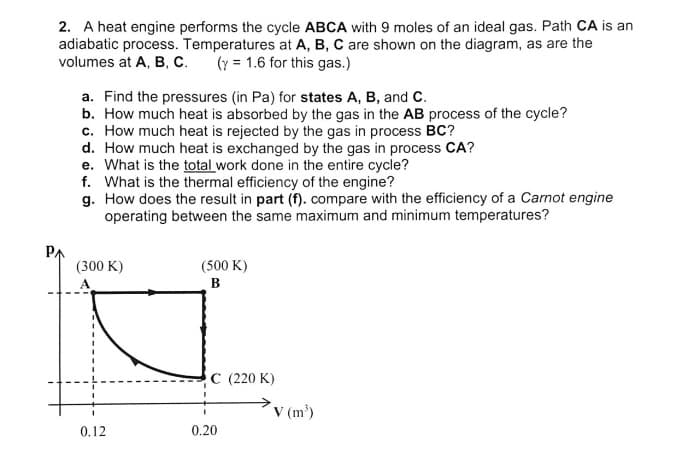2. A heat engine performs the cycle ABCA with 9 moles of an ideal gas. Path CA is an adiabatic process. Temperatures at A, B, C are shown on the diagram, as are the volumes at A, B, C. (y = 1.6 for this gas.) a. Find the pressures (in Pa) for states A, B, and C. b. How much heat is absorbed by the gas in the AB process of the cycle? c. How much heat is rejected by the gas in process BC? d. How much heat is exchanged by the gas in process CA? e. What is the total work done in the entire cycle? f. What is the thermal efficiency of the engine? g. How does the result in part (f). compare with the efficiency of a Carnot engine operating between the same maximum and minimum temperatures? (300 K) (500 K) в C (220 K) V (m') 0.12 0.20
2. A heat engine performs the cycle ABCA with 9 moles of an ideal gas. Path CA is an adiabatic process. Temperatures at A, B, C are shown on the diagram, as are the volumes at A, B, C. (y = 1.6 for this gas.) a. Find the pressures (in Pa) for states A, B, and C. b. How much heat is absorbed by the gas in the AB process of the cycle? c. How much heat is rejected by the gas in process BC? d. How much heat is exchanged by the gas in process CA? e. What is the total work done in the entire cycle? f. What is the thermal efficiency of the engine? g. How does the result in part (f). compare with the efficiency of a Carnot engine operating between the same maximum and minimum temperatures? (300 K) (500 K) в C (220 K) V (m') 0.12 0.20
University Physics Volume 3
17th Edition
ISBN:9781938168185
Author:William Moebs, Jeff Sanny
Publisher:William Moebs, Jeff Sanny
Chapter9: Condensed Matter Physics
Section: Chapter Questions
Problem 80P: What is the critical magnetic field for lead at T = 2.8 K?
Related questions
Question
Is this the correct way to solve for W(ca)
![Wca= Pa Va - Pc Ve
(1.87.10) (0.12) - [8. 261104)CO.20]
Wca=
1- 1.60
Pc =nRT
Vc
Wca: -9.87x0 ³J
= (9)(8.314) (500)
(0.2)
Pc = 8. 26 el0"
pa](/v2/_next/image?url=https%3A%2F%2Fcontent.bartleby.com%2Fqna-images%2Fquestion%2F42852a90-71e9-46e5-ae08-98949f8bff3a%2Fbc41ec14-cd8e-4882-b2b6-dd008a855edf%2Fnr27kuj_processed.jpeg&w=3840&q=75)
Transcribed Image Text:Wca= Pa Va - Pc Ve
(1.87.10) (0.12) - [8. 261104)CO.20]
Wca=
1- 1.60
Pc =nRT
Vc
Wca: -9.87x0 ³J
= (9)(8.314) (500)
(0.2)
Pc = 8. 26 el0"
pa

Transcribed Image Text:2. A heat engine performs the cycle ABCA with 9 moles of an ideal gas. Path CA is an
adiabatic process. Temperatures at A, B, C are shown on the diagram, as are the
volumes at A, B, C.
(y = 1.6 for this gas.)
a. Find the pressures (in Pa) for states A, B, and C.
b. How much heat is absorbed by the gas in the AB process of the cycle?
c. How much heat is rejected by the gas in process BC?
d. How much heat is exchanged by the gas in process CA?
e. What is the total work done in the entire cycle?
f. What is the thermal efficiency of the engine?
g. How does the result in part (f). compare with the efficiency of a Carnot engine
operating between the same maximum and minimum temperatures?
PA
(300 K)
(500 K)
в
C (220 K)
V (m')
0.12
0.20
Expert Solution
This question has been solved!
Explore an expertly crafted, step-by-step solution for a thorough understanding of key concepts.
This is a popular solution!
Trending now
This is a popular solution!
Step by step
Solved in 2 steps

Knowledge Booster
Learn more about
Need a deep-dive on the concept behind this application? Look no further. Learn more about this topic, physics and related others by exploring similar questions and additional content below.Recommended textbooks for you

University Physics Volume 3
Physics
ISBN:
9781938168185
Author:
William Moebs, Jeff Sanny
Publisher:
OpenStax

Modern Physics
Physics
ISBN:
9781111794378
Author:
Raymond A. Serway, Clement J. Moses, Curt A. Moyer
Publisher:
Cengage Learning

College Physics
Physics
ISBN:
9781285737027
Author:
Raymond A. Serway, Chris Vuille
Publisher:
Cengage Learning

University Physics Volume 3
Physics
ISBN:
9781938168185
Author:
William Moebs, Jeff Sanny
Publisher:
OpenStax

Modern Physics
Physics
ISBN:
9781111794378
Author:
Raymond A. Serway, Clement J. Moses, Curt A. Moyer
Publisher:
Cengage Learning

College Physics
Physics
ISBN:
9781285737027
Author:
Raymond A. Serway, Chris Vuille
Publisher:
Cengage Learning

College Physics
Physics
ISBN:
9781938168000
Author:
Paul Peter Urone, Roger Hinrichs
Publisher:
OpenStax College

An Introduction to Physical Science
Physics
ISBN:
9781305079137
Author:
James Shipman, Jerry D. Wilson, Charles A. Higgins, Omar Torres
Publisher:
Cengage Learning

Principles of Physics: A Calculus-Based Text
Physics
ISBN:
9781133104261
Author:
Raymond A. Serway, John W. Jewett
Publisher:
Cengage Learning